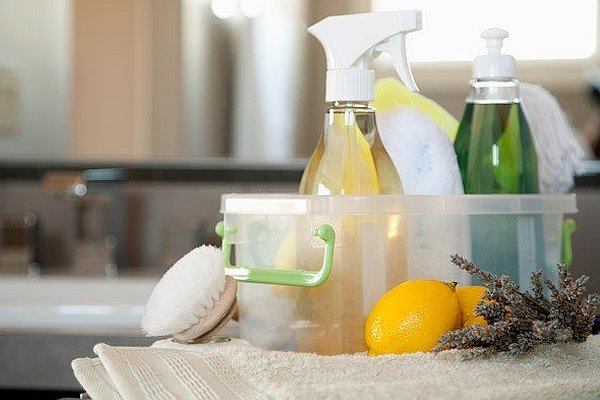It’s been said that a clean home is a happy home, but achieving this can come at a cost. Household cleaning detergents contain a cocktail of hazardous chemicals that could be harmful to your family in the long run, especially when used in the kitchen. So before whipping out, or stockpiling the ammonia packed detergents, try these simple and natural solutions.
Steam-clean your microwave
Microwaves are one the most overused appliances in the kitchen; we can defrost, cook, and bake at the mere push of a button. Unfortunately, all this traffic is bound to result in all sorts of spills and splatters, not to mention the amount germs transferred between your hands and the microwave’s buttons and door handle.
Here’s a simple, yet effective solution to a clean microwave:
- You will need a cup, a bowl, lemon juice or white vinegar and baking soda.
- Using the cup, add two parts water to one part white vinegar or lemon juice. You can add fresh lemon slices, too.
- Transfer the mixture to a microwavable glass bowl. Ensure that the bowl can hold twice the capacity of the cup’s contents.
- Microwave the mixture on high until it starts boiling and the microwave is steamed up.
- Remove the bowl with caution and wipe down the microwave with a paper towel or dishcloth.
- Soak a dishcloth in the leftover mixture and wipes, and wipe down the exterior of the microwave.
Ovens aren’t self-cleaning – you’ve got to get in there and do it yourself
Old wives tales might have you believing that grease and grime in the oven spruces up the flavour of oven goodies – I assure you that that notion is nothing more than an urban legend.
Ovens are made of a thinner material than pots and pans, so the spilled and burned food and gravy effects are somewhat different. When one spills something in an oven it stains the metal if it’s not cleaned immediately. And a long-term build up of grease and grime in the fans and on the grid causes toxic smoke when the oven is heated. This could ruin your dish, but more importantly, is hazardous to your health. For this reason, despite regular cleaning, it is recommended that you have your oven professionally cleaned if you use it often.
Tips for cleaning your oven without heavy-duty detergents:
- Use dish washing liquid to remove grease marks and to polish the glass on exterior of the oven.
- Remove burnt food spills and marks with baking soda and water. Make a paste mixture and apply as required. Allow to soak for 20-30 minutes, before removing with a soft sponge. You can use this method on stubborn stains or burnt food on your stove-top, too.
- Use lemon water to wipe down the interior of the oven after use
- Lemons can also be used to remove foul smells by placing two lemon wedges in an oven dish with a little water. Bake for approximately 30 minutes at 180 °C; ensure that the dish always has water in it.
Refrigerator Wars – if you store your food in it, you better keep a hand on it
Your refrigerator can double-up as a bacteria playground if you do not clean it regularly. It’s strongly recommended that door handles and the exterior surfaces are wiped down daily. Raw meat should also be placed in a glass bowl with a lid, even if it’s still in its original packaging.
Recommended weekly cleaning ritual:
- Soak removable shelves and drawers in dish-washing liquid or a mixture of lemon juice, baking soda and water
- Wipe down the interior with a mixture of lemon juice, baking soda, water and white vinegar
- Remove any old food i.e. fruit, vegetables, cheese and etc
- Rinse water and milk bottles regularly, too
Sanitising kitchen counters – don’t breed germs where you eat
Like your microwave and fridge, your kitchen counters are in constant use and subsequently ripe for germs and bacteria like e-coli and salmonella.
Use this effective germ-killing solution to keep your counter-tops clean:
- Mix two cups of water with half a cup of lemon juice and half a cup of white vinegar.
- Add the mixture to a plastic spray bottle and spritz the germs away.
- The solution works as an ant repellent to, too.
So there you have it – a safe, effective and natural way to keep your kitchen in a pristine and germ-free condition.



